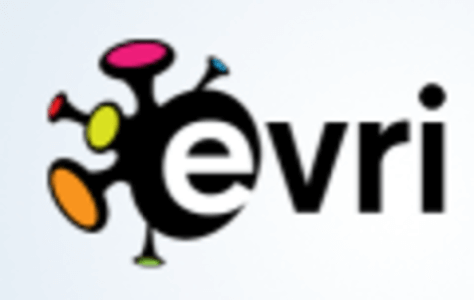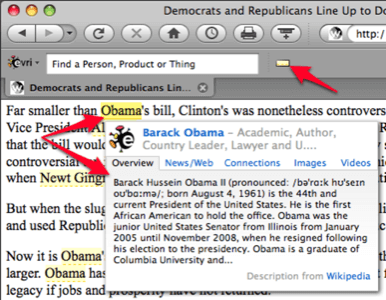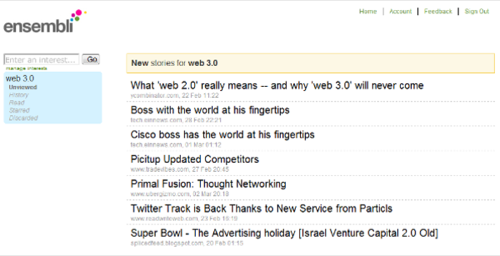Part One of a Two-Part Series
We’re moving beyond the days of a simple search box in which you type a query and get a list of results. Today, companies are trying to build a smarter web – one that understands what things are, how they relate, and perhaps most importantly, what things you’re going to like. But has Web 3.0 arrived in its full semantic glory? No, not yet. But it’s clear we are getting closer than ever before.

The Recommended Web (Xmarks + StumbleUpon)
To begin, there’s the seemingly minor announcement from Xmarks, the company formerly known as Foxmarks, but now rebranded thanks to their multi-browser support. Xmarks has introduced additional features to their bookmark synchronization product which include things like site suggestions and smarter search. By leveraging their large stash of data (600 million bookmarks), Xmarks is now able to recommend sites right within your search results. This is done by placing an Xmarks icon next to those results which are most popular, meaning most bookmarked, on their service. Also, when you visit a web site and click the Xmarks icon in your address bar, Xmarks will return a list of sites similar to the one you’re currently browsing.

The data used to deliver these recommendations and suggestions are anonymized – a good thing considering that our browser bookmarks are often the ones we have specifically chosen not to share with others. For bookmarks to become recommended in this fashion, they must be fairly popular on the service – a level that’s determined by the number of times saved as a percentage within a particular category.
In a way, what Xmarks is doing is very similar to what StumbleUpon’s browser extension does too. Like Stumble, Xmarks annotates our search results highlighting those that may be of value to us. Yet Xmarks takes it a step further by discovering related sites, too.
The Smarter Tracking Tool (Evri)
Another company revealing new innovations here at DEMO 09 is Evri, a semantic search engine which understands what’s called “natural language.” Evri knows the different parts of a sentence (subject, verb, object) and it knows how those parts are connected to each other.

Although still too raw to be your main search engine, Evri has a new “Collections” feature which lets you follow topics (aka search queries) that are of interest to you. After returning a list of search results which include Wikipedia entries, news articles, videos, and images, you can click the star labeled “Follow this” to continue to track that topic. What’s missing from this feature, though, is an alerting system which will inform you of updates via email or RSS. However, the company says that’s coming later on.
Evri is also branching out from being a web destination alone by introducing Evri widgets which can now be seen in action on the Washington Post’s web site. These widgets parse the content on the page to deliver smart recommendations of similar articles both on the site itself as well as elsewhere on the web.
Another new feature launching now is Evri’s browser toolbar. By clicking on a button next to the Evri search box in the toolbar, the people, places, and things on a web page are highlighted. Click on these items and pop-ups appear with more information about the keyword, what’s related to the topic plus news, images, and videos.

This additional layer of information on top of standard text makes browsing the web and reading articles a deeper and richer experience. No longer do you need to perform web searches in a separate window to understand definitions, context, and meaning. Instead, Evri’s toolbar adds an intelligence to the web that was never there before. It’s clear that the company is still working towards making that additional layer more accurate and more relevant, though, but conceptually the idea is solid.
The RSS Reader That Learns (Ensembli)
Ensembli, an RSS reader of sorts, takes a different approach to tracking topics than Evri does with its “Collections” feature. Where Evri’s UI can sometimes feel a bit cluttered with its multimedia results, Ensembli’s interface is simple – you just type in a topic and it will continue searching for new articles related to what you entered. But this reader doesn’t simply pull information for you – it learns what you like. Every time you read, ignore, or discard a story, Ensembli gets to know your tastes a little bit better.

While this feed reader is far too simplified for RSS junkies like us, it’s easy to see how Ensembli could be a good introductory tool for RSS beginners. Still, the sources it returns sometimes seem lacking and it’s hard to say if this will ever be any more useful that a simple Google Alert, for example. Nevertheless, it’s not really the feed reading itself which makes Ensembli intriguing, it’s the learning element. Whatever algorithm is at work behind the scenes figuring out your likes and dislikes is what’s the most important aspect of this new technology.
Getting Smarter…Little by Little
Taken by themselves, the above announcements may have seemed more evolutionary than revolutionary, but look at them within a broader scope and you can see a pattern beginning to develop. In this transitional period from Web 2.0 to Web 3.0, we’re starting to see tools and services that aim to expand upon the traditional search experience in order to deliver us to a more intelligent web. On this new web, we’re moving beyond SEO and PageRank to determine relevance and instead are seeing new technologies develop that better understand meaning, context, and personal preferences.
Stayed tuned…part 2 of “The Smarter Web” will continue tomorrow.
Image credit – dominiekth





















